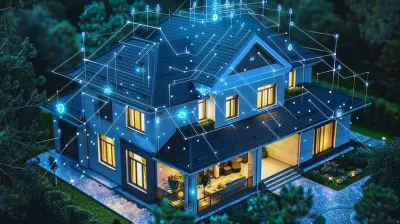28 December 2024
Let’s face it — technology is changing everything these days, and real estate is no exception. From browsing homes on your smartphone to signing contracts electronically, tech innovations are reshaping how we buy, sell, and invest in property. Whether you're a first-time homebuyer, a seasoned investor, or a real estate agent trying to keep up with the times, it's impossible to ignore the ways technology is transforming the real estate industry.
So, grab a cup of coffee (or tea, no judgment here), and let’s dive into how these tech trends are shaking things up!

The Rise of Virtual Reality (VR) in Real Estate
Remember when buying a home meant spending countless weekends driving from property to property, hoping to find “the one”? Well, VR is making that a thing of the past! Thanks to virtual reality, you can now take a 3D tour of homes without ever leaving your couch.Imagine slipping on a VR headset and walking through a property as if you were there in person. Look up? There’s the vaulted ceiling. Turn around? There’s the spacious backyard. It’s like real-life house hunting but without the hassle of traffic or awkwardly nosy homeowners.
This technology doesn’t just save time for buyers; it’s a game-changer for sellers too. Sellers can showcase their homes to potential buyers across the globe, breaking down geographical barriers. Real estate agents? They’re loving this too because it helps them reach more clients and close deals faster. A win-win, right?

Artificial Intelligence: Your New Real Estate Assistant
Let’s talk about Artificial Intelligence (AI). It may sound like something out of a sci-fi movie, but it's already integrated into the real estate market, and it’s seriously impressive. AI is the engine behind those personalized property recommendations you get on real estate apps and websites. Ever noticed how those apps often seem to know exactly what you’re looking for? That's AI working its magic.But AI doesn’t stop there. It’s also helping realtors price properties more accurately. By analyzing tons of data — like recent sales, market trends, and even neighborhood vibes — AI can predict the best listing price for any home. Think of it as a crystal ball for the housing market!
And for landlords, AI-powered property management tools are simplifying tedious tasks like rent collection, maintenance requests, and tenant screening. Honestly, it’s like having a private assistant that never takes a day off.

Blockchain: More Than Just Bitcoin
Blockchain usually gets lumped in with cryptocurrencies, but it’s making waves in real estate too. At its core, blockchain is a highly secure way of recording transactions, and in an industry where paperwork can feel endless, this is a huge deal.Ever bought a house and felt like you signed a small forest’s worth of documents? Blockchain technology is here to clear the clutter by making these transactions faster, safer, and more transparent. Think of blockchain as the ultimate notary, ensuring that all records are legitimate and tamper-proof.
Beyond paperwork, blockchain opens the door to something called tokenization. This essentially means splitting property ownership into smaller shares so that multiple people can invest. Imagine pooling resources to buy a share of a high-end condo in a bustling city rather than shelling out millions for the whole thing. Sounds pretty smart, right?

Smarter Homes, Smarter Investments
Smart home technology isn’t just cool — it’s becoming a major selling point. Buyers want homes equipped with everything from voice-activated assistants to energy-efficient lighting and advanced security systems.Picture this: You’re running late for work. With a few taps on your phone, you lock the front door, adjust the thermostat, and set the alarm system. That’s the power of smart home tech.
From a seller’s perspective, having these techy upgrades can increase property value and attract a wider pool of buyers. For homeowners, these features don’t just make life easier; they can lower utility costs and add an extra layer of security. Everybody wins.
Big Data: The Industry’s Crystal Ball
If data is the new oil, then big data is the refinery — and it’s completely transforming real estate. Thanks to big data, buyers can now access detailed insights about neighborhoods, schools, and local amenities before making a decision.Ever spent weeks researching crime rates, property taxes, or school districts before choosing where to live? Big data handles all of that in seconds. Platforms powered by big data give you all the info you need to make an informed choice, beautifully packaged in easy-to-read formats.
For agents and brokers, big data provides actionable insights into market trends. Knowing when and where property prices are likely to rise or fall can mean the difference between a good investment and a great one.
The Role of Drones in Real Estate
Drones are no longer just a toy for tech enthusiasts; they’re now a must-have tool for the real estate industry. These flying cameras are perfect for capturing stunning aerial views of properties and neighborhoods, giving prospective buyers a better sense of the area.Got a sprawling backyard or a killer rooftop deck? A drone can showcase your property’s best features from angles you didn’t even think were possible. And for commercial real estate, drones are invaluable for surveying large plots of land or giving clients a bird’s-eye view of development projects.
The Impact of 5G Connectivity
If you think 4G is fast, wait until you see what 5G can do. The rollout of 5G networks is enhancing how we experience digital real estate services. With blazing-fast speeds and ultra-low latency, 5G is making technologies like VR tours and AI-powered apps even more seamless.Imagine browsing a property catalog with zero lag or taking a 3D home tour that feels as smooth as walking through the place in person. For rural areas where internet speeds have historically been slower, 5G is a game-changer, leveling the playing field for buyers and sellers alike.
The Human Element: Will Tech Replace Realtors?
Now, let’s address the elephant in the room: Will technology make real estate agents obsolete? Short answer: Nope. Long answer? While technology is streamlining many aspects of the home buying and selling process, there’s still no replacement for the human touch.Buying or selling a home is an emotional journey. People still want guidance, support, and someone to lean on when things get stressful. A VR tour can show you a home’s layout, but it can’t tell you how the neighborhood feels on a Sunday afternoon. AI can suggest properties, but it can’t negotiate the best deal on your behalf.
In the end, technology isn’t here to replace realtors; it’s here to help them work smarter. Think of it as a partnership where humans and tech join forces to create the best experience for buyers and sellers.
Wrapping It Up
Technology is rewriting the real estate rulebook, and honestly, it’s pretty exciting. From virtual reality and AI to blockchain and smart home features, these innovations are making the industry more efficient, transparent, and accessible.But at its core, real estate is still about people — their dreams, their families, their futures. And while tech can enhance the process, it’ll never replace the human element that makes buying or selling a home so special.
So, whether you’re scrolling through listings on your phone, taking a VR home tour, or chatting with your realtor about the latest market trends, remember: Technology is here to make the journey easier, not take it over.











Azura McGhee
Embrace the future! Technology is revolutionizing real estate, unlocking new opportunities and efficiencies. From smart homes to AI-driven insights, these trends empower buyers and sellers to elevate their game. Let’s innovate together!
March 29, 2025 at 12:40 PM